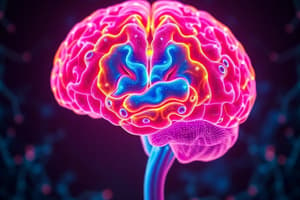Podcast
Questions and Answers
What is the primary focus of cognitive psychology?
What is the primary focus of cognitive psychology?
- The study of emotions and their impact on behavior
- The study of the physical brain and its structures
- The study of mental processes such as perceiving and reasoning (correct)
- The study of social behaviors and interactions
Which of the following best explains why psychologists study mental processes?
Which of the following best explains why psychologists study mental processes?
- To gain insights into how mental processes relate to behavior (correct)
- To understand that behavior is solely driven by biological factors
- To focus only on observable behaviors without considering thought processes
- To compare different psychological theories
What role do intentionality and goals play in cognitive psychology?
What role do intentionality and goals play in cognitive psychology?
- They are seen as distractions from mental processes
- They are key factors influencing behavior and thought (correct)
- They are irrelevant to understanding behavior
- They are considered purely emotional phenomena
What aspect of psychology examines the computational aspects of meaning in reading?
What aspect of psychology examines the computational aspects of meaning in reading?
In cognitive psychology, which method is typically employed to investigate mental processes?
In cognitive psychology, which method is typically employed to investigate mental processes?
Which of the following is NOT a reason for studying cognitive psychology?
Which of the following is NOT a reason for studying cognitive psychology?
What is a key idea in cognitive psychology regarding human cognition?
What is a key idea in cognitive psychology regarding human cognition?
Cognitive psychology emerged as a distinct field primarily in which period?
Cognitive psychology emerged as a distinct field primarily in which period?
Flashcards are hidden until you start studying
Study Notes
Cognitive Psychology
- The study of mental processes such as perceiving, remembering, and reasoning.
- Psychologists study these processes because they believe that behavior is the result of mental processes.
Research Methods in Cognitive Psychology
- Aim to understand how mental processes affect behavior.
- Goal: Learn how people perceive, remember, think, and make decisions.
- Distinctive Research Methods:
- Experimental Methods: Rigorously designed experiments to test hypotheses about cognitive processes.
- Computational Modeling: Use computers to simulate cognitive processes.
- Neuroimaging Techniques: Methods like fMRI and EEG to study brain activity during cognitive tasks.
Domains of Cognitive Psychology
- Perception: How we interpret and understand the world through our senses.
- Attention: How we focus our cognitive resources on specific stimuli.
- Memory: How we store and retrieve information.
- Language: How we use language to communicate and think.
- Reasoning and Decision Making: How we solve problems and make choices.
A Brief History of Cognitive Psychology
- Early Thoughts of Thinking: Ancient philosophers like Plato and Aristotle pondered the nature of thought and knowledge.
- Cognition in the Renaissance and Beyond: Renewed interest in the human mind, with figures like Francis Bacon and René Descartes.
- Cognitive Psychology in Early Twentieth Century: Emergence of the field as a distinct discipline, influenced by behaviorism and Gestalt psychology.
- Cognitive Psychology - As It Is Today: Focuses on understanding the underlying mechanisms of cognition using advanced techniques and research methods.
Key Issues in the Study of Cognitive Psychology
- Nature vs. Nurture: How do our genes and our experiences shape our cognitive abilities?
- Developmental Processes: How do our cognitive abilities change from infancy to adulthood?
- Individual Differences: Why do people differ in their cognitive skills?
- Applications: How can cognitive psychology be used to solve real-world problems?
Key Ideas in Cognitive Psychology
- Computer Metaphor and Human Cognition: Our minds are like computers, processing information through a series of steps.
- Cognitive Science: An interdisciplinary field that draws on psychology, computer science, linguistics, and neuroscience to study cognition.
- Neuroscience and Cognitive Psychology: Combining brain imaging techniques with cognitive experiments to understand the neural basis of cognition.
Studying That Suits You
Use AI to generate personalized quizzes and flashcards to suit your learning preferences.



